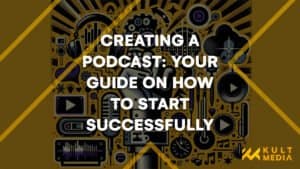In the world of author personal branding, it’s crucial to establish a strong presence that resonates with your target audience. By utilising your skills and crafting engaging material, you can maximise your reach and form ties that will boost your brand.
This blog post delves into five essential strategies for developing impactful author personal branding. You’ll learn how to harness the power of podcasting, create captivating content tailored to your core identity, expand your reach through strategic social media use, foster meaningful relationships within the industry, and track performance metrics to ensure continued growth.
Table of Contents:
- Leverage Your Expertise Through Podcasting
- Create Engaging Content
- Maximise Your Reach
- Build Connections
- Track Performance
- FAQs in Relation to Author Personal Branding
- Conclusion
1. Leverage Your Expertise Through Podcasting
Podcasting has become an increasingly popular medium for sharing knowledge and expertise with the world. By creating a podcast, you can effectively demonstrate your authority in the area while growing your individual identity at the same time. In this section, we’ll explore how to leverage podcasting to showcase your expertise, build an author brand, and expand your reach.
A. Choose a Niche Topic
To begin with, it’s essential for your author brand to choose a niche topic that aligns with both your area of expertise and the interests of your target audience. Ensure that the material you generate is pertinent, captivating, and advantageous to those who are probably going to gain from it by selecting a subject area that corresponds with both your skillset and the interests of your intended audience. For inspiration on finding the perfect niche for you, check out this guide on choosing a podcast topic.
B. Develop High-Quality Content
Your credibility as an expert hinges upon the quality of content you produce; you can’t just post book covers and hope that’s enough; therefore, investing time into researching each episode thoroughly is crucial for success in the podcasting realm. Consider how you’re writing and planning your tone, style, and how you want the audience to perceive you; this is your brand message. Share actionable insights backed by research or real-life experiences; these types of content tend to resonate well with listeners seeking practical advice from industry experts like yourself.
- Interviews: Invite other professionals within your field onto episodes – this not only adds variety but also helps build relationships among peers.
- Tutorials: Provide step-by-step instructions on specific tasks or processes related directly to the chosen niche subject matter.
- Case studies: analyse successful examples within a given sector so audience members may learn firsthand about what works best when tackling similar challenges themselves.
Check out our Podcasting Guides to level up your content creation: How To Be A Leading Podcast Host & Practical Podcasting Checklist
C. Promote Your Podcast
Once you have your podcast ready to go, start spreading the word and making it known. Utilise various marketing channels such as social media, email newsletters, and guest appearances on other podcasts to share your brand message and increase your visibility among your target audiences. Podcasting is about starting a conversation.
You can’t post, ghost, and expect to see massive growth. You should set aside a few hours every week to engage with potential listeners or collaborators. Think of marketing as engaging in discussion about how your podcast can help the listener rather than promoting your publishing schedule.
D. Network with Industry Leaders
As a podcaster looking to establish yourself as an expert in your field, networking is essential. Reach out to industry leaders and influencers who share similar interests or work within the same niche; they may be interested in collaborating or even appearing as guests on future episodes. Building these connections not only helps expand reach but also solidifies reputations among peers.
Exploiting your skills through podcasting can help you become a respected leader in your area and cultivate an enthusiastic fan base. Let’s explore ways to generate stimulating material that will draw in an audience and keep them engaged.
To establish oneself as an expert in a field and grow one’s personal brand, podcasting is an effective medium. Choosing a niche topic, developing high-quality content through interviews, tutorials, or case studies, promoting the podcast across various platforms, and networking with industry leaders are key steps to leveraging expertise through podcasting.
2. Create Engaging Content
Producing appealing material is essential for the expansion of your personal brand and business. To stand out from the competition, provide content that is valuable and relevant to your target audience. Let’s dive into some strategies that will help you create captivating content.
A. Know Your Audience
The first step in creating engaging content is understanding who your target audience is and what they want to consume. Conduct thorough audience research, identify their pain points, preferences, and interests to tailor your content accordingly.
B. Tell a Story
You know this already, but people love stories. Incorporate storytelling into your content creation process, as it helps build an emotional connection with readers or listeners while making complex topics more digestible. For inspiration on how to weave stories into your work, check out these storytelling techniques.
C. Utilise Different Formats & Platforms
- Blog Posts: Share insights and knowledge through well-researched articles on relevant industry topics.
- Videos: Leverage video platforms like YouTube or Instagram Reels for tutorials, product demos, or behind-the-scenes glimpses of your business.
- Social Media: Use platforms such as Twitter, LinkedIn, Facebook, etc., for sharing bite-sized tips and updates about recent projects or events.
- Email Newsletters: Keep subscribers informed about new product/service launches along with valuable industry news.
D. Encourage Interaction & Feedback
Engaging content should spark conversations among readers or listeners. Include open-ended questions in your blog posts or podcasts, invite comments on social media posts, and encourage feedback through email newsletters to foster interaction with your audience.
By utilising these tactics to create content, you can start forming a dedicated following around your brand and enterprise.
Creating engaging content is key to building a successful personal brand. Maximising the effectiveness of your content requires knowledge of where to post it for optimal results.
To create an engaging personal brand, it is important to know your audience and tailor content accordingly. Incorporating narratives into various formats, such as blogs, videos, social media posts, and email newsletters, can help to evoke strong emotions from readers or listeners. Optimising for SEO and encouraging interaction through open-ended questions and feedback can also increase visibility and foster a community around your brand.
3. Maximise Your Reach
Step 3 to successful author personal branding
So, you’ve created some killer content and established yourself as an expert in your field through podcasting. However, how do you make sure that the right people see (or hear) all of this fantastic work? It’s time to discover approaches for expanding the scope of your material and enhancing recognition of your individual brand.
A. Utilise Social Media Platforms
Social media is a powerful tool when it comes to increasing the reach of your content. By sharing on platforms like Facebook, Twitter, LinkedIn, and even newer players like TikTok, you can tap into a vast audience that may be interested in what you have to say. Don’t forget about niche social networks specific to your industry; these can be goldmines for reaching highly engaged users.
B. Optimise Content for Search Engines (SEO)
To truly maximise the reach of your content, it’s essential that search engines can find it easily too. Invest time in learning about SEO best practises or consider hiring an expert if needed; this will help ensure that more people discover your podcasts and articles organically via Google searches.
Some key areas to focus on include keyword research, optimising titles and meta descriptions, using header tags effectively (<H1>, <H2>, etc.), creating high-quality backlinks from reputable sources, and ensuring fast page load times.
C. Collaborate with Influencers & Industry Professionals
An excellent way to expand your reach is by collaborating with influencers and industry professionals who have a large following. By featuring them on your podcast or writing guest posts for their blogs, you can tap into their audience and increase visibility for your personal brand.
Remember, collaboration works both ways – offer value in return by promoting their content on your platforms as well.
D. Repurpose Your Content
By utilising content in multiple ways, you can make sure it reaches its full potential and engages your audience. Turn podcasts into blog articles, create infographics from data-driven pieces, or even develop short video clips from longer interviews. By repurposing content, you can reach a wider audience and keep them engaged with fresh and interesting material.
E. Engage With Your Audience
Last but not least, don’t forget about the power of engagement. Responding to comments on social media or within blog post comment sections helps build relationships with potential customers and fans alike, plus it shows that there’s a real person behind the brand.
This kind of genuine interaction will make people more likely to share your content with others, helping maximise its reach even further.
Maximising your reach is essential for growing and expanding any personal brand. By building connections, you can further extend the impact of your content and increase its visibility with potential customers or clients.
To maximise the reach of your content and increase visibility for your personal brand, utilise social media platforms, optimise content for search engines (SEO), collaborate with influencers and industry professionals, repurpose your content effectively, and engage with your audience by responding to comments on social media or within blog post comment sections. Remember that collaboration works both ways; offer value in return by promoting their content on your platforms as well.
4. Build Connections
Constructing ties with individuals of influence and other industry professionals can be an advantageous approach to augmenting your personal brand. In this section, we’ll discuss how you can forge meaningful relationships that will help elevate your brand’s visibility and credibility.
A. Collaborate with Influencers
By working with influencers who have a like-minded following, you can significantly elevate your personal brand. By collaborating on podcasts or other forms of content, you not only tap into their existing fan base but also gain valuable insights from their expertise.
Here are some tips to get started:
- Identify relevant influencers: Look for individuals who have an engaged following in your niche and align well with your values.
- Pitch collaboration ideas: Reach out to them with creative proposals that highlight mutual benefits – such as co-hosting a podcast episode or conducting joint interviews.
- Maintain relationships: After working together, stay connected by engaging on social media, attending events they host, or even planning future collaborations.
B. Network Through Guest Appearances
You don’t have to create content to increase your reach. Making guest appearances on established podcasts within your industry is another excellent way to build connections while showcasing your expertise. You’ll benefit from the exposure provided by someone else’s platform while contributing value to their audience; it’s a win-win. To secure these opportunities:
- Research relevant podcasts: Find shows that cater to your target audience and have a history of featuring guests with similar expertise.
- Craft a compelling pitch: Clearly articulate the unique insights you can bring to their show, focusing on how it will benefit their listeners.
- Be an engaging guest: Prepare well for the interview, be conversational, and share actionable advice – this will leave a lasting impression on both the host and their audience.
We have a free guide to help you with your podcast guest appearances: How To Be The Best Podcast Guest
C. Engage in Online Communities
Becoming an active member of online communities related to your industry is another way to build connections while positioning yourself as an authority figure. By participating in discussions, sharing valuable content (including your own), and offering help where needed, you’ll organically attract like-minded professionals who may become collaborators or even clients. Some popular platforms include:
Building connections is an essential part of author personal branding and will help you gain recognition for your work. Next, let’s look at gauging the outcome of our endeavours.
To build connections and elevate your personal brand’s visibility, collaborate with relevant influencers by pitching creative proposals that highlight mutual benefits. Network through guest appearances on established podcasts within your industry to showcase your expertise while contributing value to their audience. Engage in online communities related to your industry by participating in discussions, sharing valuable content, and offering help where needed.
5. Track Performance
Now that you’ve created and shared your fantastic content, it’s time to measure its success. Once you have shared your content, it is important to track its performance in order to refine and optimise your strategy for better results. In this part, we’ll look at a variety of measurements to watch and some convenient instruments to make following them simple.
A. Key Metrics to Monitor
- Reach: Measure how many people have seen or been exposed to your content by tracking impressions, downloads (for podcasts), or views (for videos).
- Engagement: Analyse how well your audience interacts with your content through likes, comments, shares, average watch/listen times (for video or podcast), and click-through rates (CTR) on links within the content.
- Conversions: Determine whether users are taking desired actions after consuming your content, such as signing up for newsletters or making purchases.
B. Tools for Tracking Content Performance
To effectively track these key metrics across different platforms where you share your content – social media channels like Facebook or LinkedIn; podcast hosting sites like Apple Podcasts or Spotify; YouTube channel analytics – there are several powerful tools available at our disposal:
- Google Analytics: is a comprehensive web analytics tool that provides insights into website traffic sources and user behaviour patterns related to engagement and conversions.
- Buffer Analyse is an easy-to-use social media analytics tool that helps you track the performance of your content on various social media platforms, including reach and engagement metrics.
- Chartable is a podcast analytics platform that tracks downloads, listener demographics, and rankings across different podcast directories to help you understand how well your show is performing.
By tracking vital metrics with the right tools, you can make decisions based on data to identify which content resonates best with your listeners. This will ultimately lead to more effective personal branding efforts through targeted content creation strategies tailored specifically for those who matter most – your target audience.
To improve your personal branding, it’s crucial to track the performance of your content. Key metrics to monitor include reach, engagement, and conversions. There are several tools available, such as Google Analytics, Buffer Analyse, and Chartable, that can help you analyse how well your audience interacts with your content across different platforms.
FAQs in Relation to Author Personal Branding
What is personal branding for authors?
Personal branding for authors involves creating a unique identity, image, and reputation that sets them apart from other writers. This can include their writing style, genre focus, online presence, and public persona. A strong personal brand helps authors build credibility and attract readers.
What are the 5 C’s of personal branding?
The 5 C’s of personal branding are Clarity (defining your unique value proposition), Consistency (maintaining a cohesive message across platforms), Commitment (investing time in building your brand), Creativity (using innovative strategies to stand out), and Communication (engaging with your audience).
Why is branding important for authors?
Branding is crucial for authors because it helps establish their expertise, differentiate themselves from competitors, create trust among readers, increase visibility in the market, and ultimately drive book sales. A well-defined brand also makes it easier for potential readers to identify an author’s work.
What is personal branding in journal articles?
In academic publishing contexts like journal articles or research papers, personal branding refers to establishing a professional identity by demonstrating subject matter expertise and thought leadership through consistently producing high-quality content on relevant topics that resonate with target audiences.
Conclusion
In conclusion, author personal branding is crucial for small businesses and marketing professionals looking to grow their brand through content creation. By leveraging your expertise through podcasting, creating engaging content, maximising your reach, building connections, and tracking performance, you can establish yourself as an authority in your industry and build a loyal following.
To maintain a successful personal brand, consistency is paramount. Produce content of a high calibre that resonates with your desired viewers and interact with them consistently on various social media sites. With dedication and effort, you can create a powerful personal brand that sets you apart from the competition.
If you’re ready to take the next step in building your author personal branding strategy, contact us at Kult Media today!












